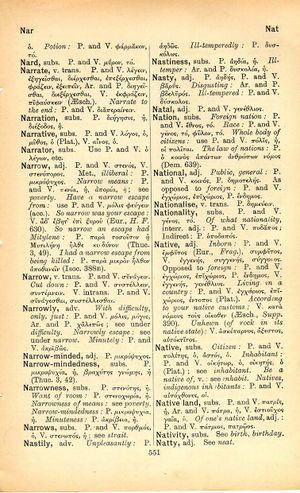narrative: Difference between revisions
From LSJ
Ἐλεεινότατόν μοι φαίνετ' ἀτυχία φίλου → Miseria amici mihi suprema est miseria → Am meisten Mitleid, scheint's, heischt eines Freundes Leid
m (Text replacement - "}}]]" to "}}]]") |
m (Text replacement - "(|thumb)\n(\|link=)" to "$1$2") |
||
| Line 1: | Line 1: | ||
{{Woodhouse1 | {{Woodhouse1 | ||
|Text=[[File:woodhouse_551.jpg|thumb | |Text=[[File:woodhouse_551.jpg|thumb|link={{filepath:woodhouse_551.jpg}}]]'''subs.''' | ||
|link={{filepath:woodhouse_551.jpg}}]]'''subs.''' | |||
P. and V. [[λόγος]], ὁ, [[μῦθος]], ὁ (Plat.), V. [[αἶνος]], ὁ. | P. and V. [[λόγος]], ὁ, [[μῦθος]], ὁ (Plat.), V. [[αἶνος]], ὁ. | ||
}} | }} | ||
Revision as of 17:39, 18 May 2020
English > Greek (Woodhouse)
subs.
P. and V. λόγος, ὁ, μῦθος, ὁ (Plat.), V. αἶνος, ὁ.
Latin > English (Lewis & Short)
narrātīvē: adv. narro,
I in the way of narration, Don. ad Ter. argum. And.
Latin > French (Gaffiot 2016)
narrātīvē (narrativus), en racontant, au moyen d’un récit : Don. Andr. Arg.
Latin > German (Georges)
nārrātīvē, Adv. (narrativus), erzählend, Donat. ad Ter. argum. Andr. vol. 1. p. 4, 29 ed. Klotz.

